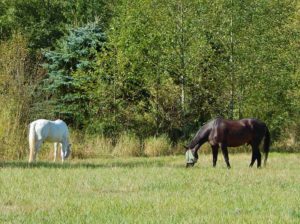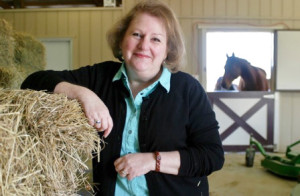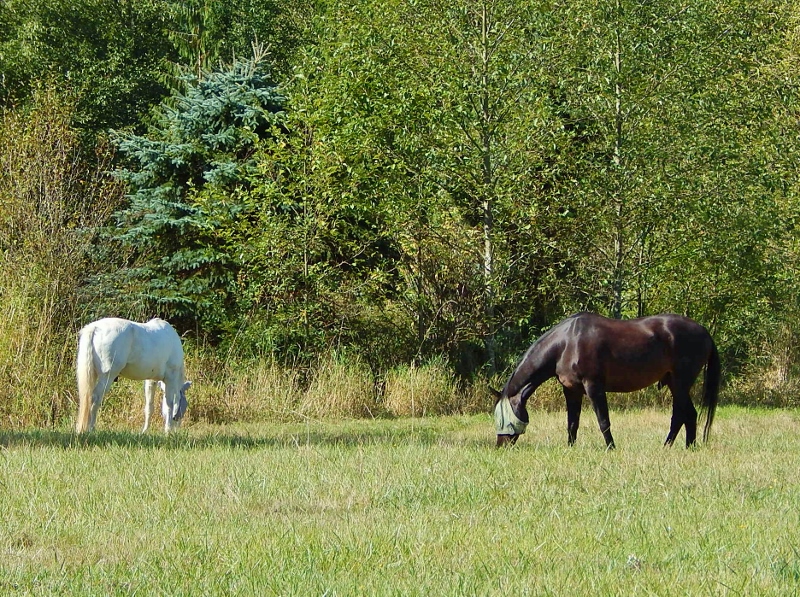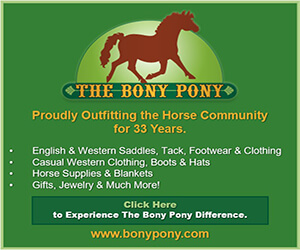Key Considerations for Equine Well-being
By Juliet M. Getty, Ph.D.

We know they’re out there. Horses brimming with health – strong muscles, shiny coats, hard hooves, good digestion, normal metabolism, strong immune function – just plain healthy! How does this happen? What is it about their care that gives them such well-being?
We study sick horses, but that only helps us to understand disease. We look at fat horses to understand fat horses. We look at horses with pain, metabolic problems, and digestive ailments to understand those who are experiencing the same hardships. But, it also makes sense to evaluate fit, hearty horses so we can strive to make our own horses more like them. Shouldn’t we be looking at what healthy horses experience?
The Recipe for a Healthy Horse
Avoid feeding excess calories. Obesity is a real problem and it comes from piling on the calories, combined with lack of exercise. Forage should be the dietary staple and it should flow steadily throughout the horse’s entire gastrointestinal tract. Pounds and pounds of concentrated feeds can shorten a horse’s life.
Prevent winter weight gain by imitating nature. In a natural setting, feed is sparse during winter. The horse grazes continually but on fewer calories, so he doesn’t become overweight. Then, when the spring grasses come, he enjoys them without the risk of developing laminitis because his body has not been put into a state of insulin resistance (through too much body fat). To imitate this cycle, the horse should be helped to stay trim by being fed all the quality, varied forages he wants, and only enough concentrates to meet his supplemental needs.
Keep up with your horse’s exercise regimen throughout the winter—think of it as substituting for the way a horse in the wild will move over large expanses in search of winter food.
Keep stress to a minimum. The hormonal response to stress can do terrible things to a horse’s body. Stress makes a horse more likely to develop infections, allergies, skin disorders, and to become insulin resistant. Stress produces free radicals that potentially damage every tissue in the body, including the brain, blood vessels, hooves, eyes, skin, and digestive tract. Stress also contributes to a horse’s poor attitude. Limiting stressors helps prevent ulcers, laminitis, and colic, and promotes an amiable, willing attitude.
A horse should be able to eat when he wants, and not be bound (stressed) by the owner’s schedule. Forage, preferably fresh grasses, should always be available so the horse can self-regulate his intake according to his instincts. He should be unencumbered by contraptions that inhibit his natural way of living. And he should have company. Companionship protects him against threats (real and perceived), keeps him calm, allows his digestion to work properly, and allows him to rest well.
Fill the nutritional gaps and build a strong immune system. Grass, when dried for hay, loses nutritional value, so supplement a hay diet by giving the proper vitamins and minerals as well as omega 3s. Feed a variety of protein sources to supply a large enough amino acid pool for the body to produce and repair tissues, keep blood proteins where they need to be, and naturally fight off disease.
Make movement a part of the horse’s daily life. Confinement is stressful and debilitating. The horse’s sense of safety depends in large measure on being able to move in response to fear. Furthermore, standing in one place wreaks havoc on his body.
If stall housing is necessary, make sure the horse gets plenty of exercise every day. Exercise keeps the digestive system healthy. Without it, the horse can develop ulcers and colic, his hooves can become weak and thin, his joints deteriorate, and his overall natural healing ability is diminished. Movement also inhibits weight gain; exercise makes the cells more receptive to insulin, allowing the body to burn fat.
Meet the horse’s evolving needs as he ages. Exercise maintains muscle and protects aging joints, so the wise owner encourages movement and feeds enough quality protein, vitamin C, and omega 3s to slow down the progression of arthritis. Care for your horse’s teeth and check his blood for proper kidney and liver function. Since saliva production diminishes with age, moisten your horse’s food so he can chew better, and feed at ground level to help prevent choking (a common problem with aged horses).
Variety is the key to balanced nutrition. Eating the same thing day in and day out can lead to nutritional imbalances. Horses need different types of grasses, weeds, bushes, berries, flowers, and trees. This is the ideal —all you would need to add is water and salt. Few of our horse properties offer this variety, so we rely on hay. Realize that hay provides only basic forage for a healthy digestive tract; it is missing many key nutrients so provide a good vitamin/mineral supplement, a source of omega 3 fatty acids, and possibly other protein sources.
Keep it simple
We are so busy micromanaging our horses’ lives that we have forgotten the basics: fresh air, water, companionship, freedom to move, and fresh grasses and plants. Your horse will thank you, and you can have the satisfaction of knowing that you are giving your horse a lifetime of vibrant health.
 Juliet M. Getty, Ph.D. is an internationally respected, independent equine nutritionist. She provides a world of useful information for the horseperson at www.gettyequinenutrition.com. Sign up for her informative, free monthly newsletter, Forage for Thought; browse her library of reference articles; search her nutrition forum; and purchase recordings of her educational teleseminars. Her books are all available through her website with special pricing offers. And for the growing community of horse owners and managers who allow their horses free choice forage feeding, Dr. Getty has set up a special forum as a place for support, celebrations, congratulations and idea sharing. You can reach Dr. Getty directly at [email protected].
Juliet M. Getty, Ph.D. is an internationally respected, independent equine nutritionist. She provides a world of useful information for the horseperson at www.gettyequinenutrition.com. Sign up for her informative, free monthly newsletter, Forage for Thought; browse her library of reference articles; search her nutrition forum; and purchase recordings of her educational teleseminars. Her books are all available through her website with special pricing offers. And for the growing community of horse owners and managers who allow their horses free choice forage feeding, Dr. Getty has set up a special forum as a place for support, celebrations, congratulations and idea sharing. You can reach Dr. Getty directly at [email protected].

Juliet M. Getty, Ph.D. is an independent equine nutritionist with a wide U.S. and international following. Her research-based approach optimizes equine health by aligning physiology and instincts with correct feeding and nutrition practices. Dr. Getty’s goal is to empower the horseperson with the confidence and knowledge to provide the best nutrition for his or her horse’s needs. Learn more at www.gettyequinenutrition.com.






